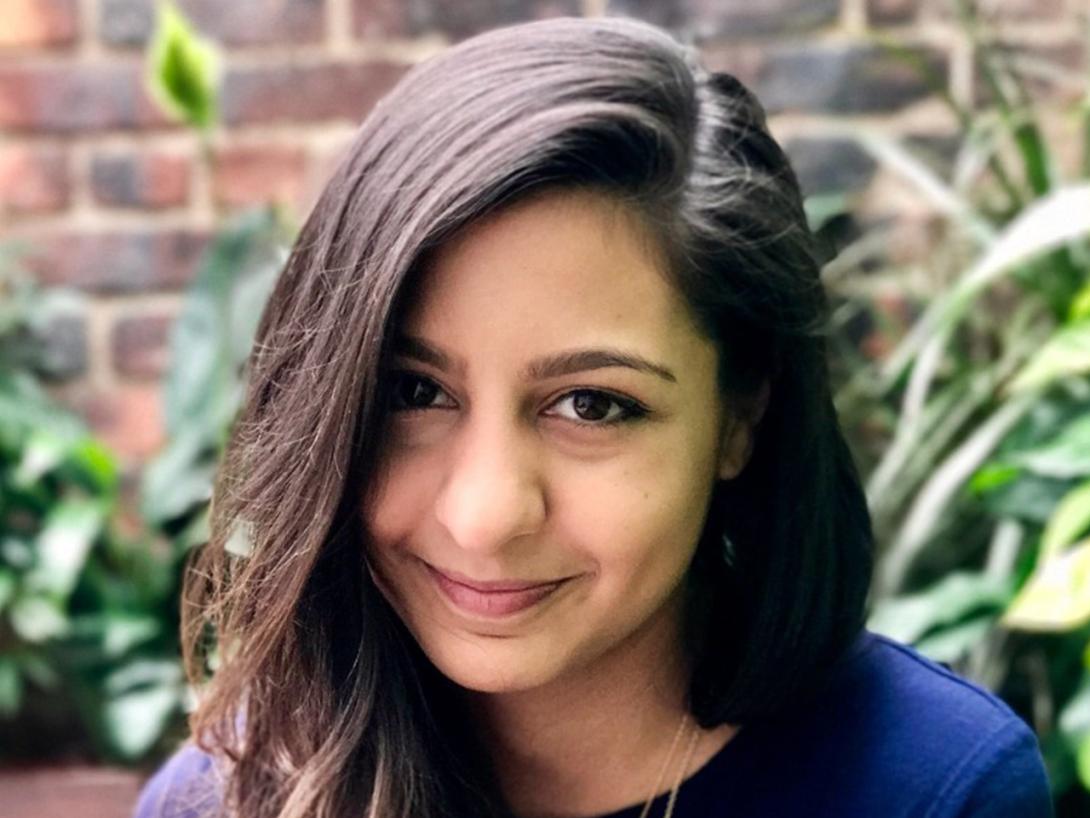September 6, 2023 | By Nick Pfost
One reason Intergroup Dialogue—the Michigan Model in particular—works is because it prioritizes relationship building and learning about social identity to form a solid foundation for having hard conversations across differences. It’s simple yet powerful.
A stubborn question is: how do you start off doing this work—and the work of leading and supporting programs, organizations, and people on their social justice, dialogue, and intergroup relations journeys— knowing leaders often reach out for help after they’ve identified an issue?
Another: What about when leaders think they’re actually being proactive, but themselves aren’t aware of existing underlying harm?
They’re questions Elise Jayakar often asks herself in her consulting and professional roles. The truth is that every situation, every case, and every person is different. It can be complicated and imperfect. Jayakar, a 2016 sociology and Asian studies graduate, is now a consultant and the assistant director of justice, diversity, equity, and inclusion for Good Shepherd Services. “Most outreach to DEI consultants tends to be because of an existing issue… Sometimes you have folks who’ve experienced harm in a room with others who may still be learning and creating harm.”
That was the case when Jayakar was approached by a private school to help them navigate healing in the wake of a Halloween party where a number of attendees wore costumes depicting racist tropes. “There was a lot of pain,” Jayakar said.
It was a situation where relationships did exist, but a foundation of Intergroup Dialogue didn’t. The approach Jayakar took to help the school was adapted to their circumstance and need by using the principles and skills she explored and honed through IGR—Understanding power and privilege, cultivating empathy, navigating and guiding group dynamics, and practice in facilitation through CommonGround and the IGR’s courses.
“We knew we needed to do some pre-work with students of color to meet their immediate needs. We created space for them to talk, share their pain, hurt, frustrations, wants, ideal solutions, everything.” They worked separately with participants who perpetrated the harm before then bringing the community together. Through that process, students were able to acknowledge and apologize for the harm that was caused, and meet the asks of the students of color who were harmed.
A solid footing
Before consulting—relatively fresh out of undergrad and with a solid footing in Intergroup Dialogue from IGR—Jayakar was well-positioned to use her voice, commitment to justice, and community organizing skills.
After graduating from U-M, Jayakar went on to complete a master’s degree in social work at Columbia University. She joined the community amid the early stages of a student movement pushing Columbia’s School of Social Work to explicitly incorporate social justice issues of power, racism, oppression, and privilege into the curriculum. For social workers, she and her peers felt these competencies were essential to their own growth and their future clients, partners, and colleagues.
There was already a list of student demands for curricular and institutional change when she started school in January that year, said Jayakar, pointing to the collective responsibility of the task. As students in two-year programs, they also had to be persistent. “It took a lot of pushing and organizing direct actions to confront school leadership,” she said.
The student-led efforts took faculty and staff buy-in, too. Together, Jayakar and her peers convinced the school’s leadership to explore how to create a course for students to learn about social justice. Their tenacity and expertise made Jayakar and a half-dozen peers key partners to the school in wading through the questions that arise when new courses are being developed— even after graduating, Jayakar and others were retained to co-teach and push this work across the finish line.
The course was launched and combined with the program’s “Foundations of Social Work Practice: Decolonizing Social Work” course, which is a key introductory course for all students enrolled in the program. In the year after graduating, Jayakar and the others trained faculty on facilitating the class. This experience kickstarted Jayakar’s interest in the consulting business.
Moving forward
In fall 2022, Jayakar took a new role with Good Shepherd Services, a New York City-based social service agency. As assistant director of justice, equity, diversity, and inclusion, she helps inform and lead the organization's strategic planning, policies and practices, and systems, as well as its affinity organizations. It’s a necessarily broad portfolio that allows her to tap into the organization’s full community—a quality she felt was so special about IGR.
“Yes, IGR is doing social justice education. Yes, you’re learning. But you’re also building a space that allows for that learning.” And while Jayakar still considers herself relatively new to Good Shepherd Services, that’s exactly the type of culture she hopes to foster and reinforce there.
"The one thing I’m most certain about is that IGR changed my life."
Reflecting on her time at IGR, Jayakar didn’t mince words. “The one thing I’m most certain about is that IGR changed my life. For the first time, I was in a space where I saw my own value and was able to express that in dialogue.” IGR gave her the language, she said, to articulate her feelings and observations and be understood by others. “To be able to foster your own voice, to be confident, to speak your mind—It’s often underestimated how difficult that is.”
“The thing about IGR is that you can put the things you learn about dialogue into any career path,” she added. “And you can apply it to your life.”

